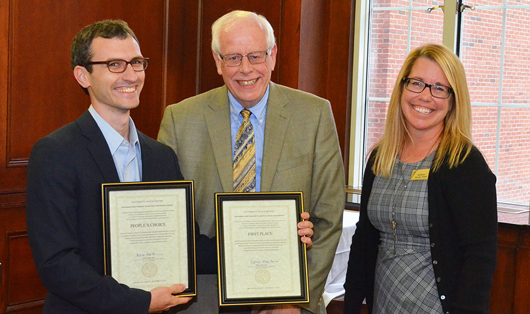
Stephen Steadman '64, center, presents Kevin Mazurek, left, with the first place honor and audience prize at the Meliora Weekend competition for the Steadman Family Postdoctoral Associate Prize in Interdisciplinary Research. Steadman, who received a BS in physics from the University of Rochester, is a scientific administrator at the Laboratory for Nuclear Science and the Department of Physics at MIT. Melissa Sturge-Apple, dean of graduate studies, is at right. (University of Rochester photo / Bob Marcotte)
Even simple movements require the integration of information from multiple areas of the brain. This process breaks down when brain damage occurs, resulting in neurological disorders.
But what if researchers could find a way to bypass those damaged areas and maintain the flow of information?
Kevin Mazurek, a postdoctoral fellow in the lab of Marc Schieber, professor of neurology, described how the lab is making progress in doing just that. He finished in first place and took the audience prize as well in the Meliora Weekend competition for the Steadman Family Postdoctoral Associate Prize in Interdisciplinary Research.
Mazurek’s prizes were worth $1,250.
Using micro electrical stimulation in primates, “we’ve shown that we can deliver the information successfully to two functionally different areas of the brain,” Mazurek explained. “This is an important first step.”
The next steps in the research, which incorporates neurology, neuroscience, electrical engineering, and biomedical engineering, include expanding the ability to communicate information across a wide reach of brain areas. This could “potentially improve the quality of living for individuals with injuries such as stroke, traumatic brain injury, or Alzheimer’s disease.”
This is the second year of the competition.
It is open to all postdoctoral scholars and appointees in the School of Medicine and Dentistry, and in Arts, Sciences & Engineering. Four prizes are awarded for research that exemplifies the importance of cross- disciplinary approaches toward examining high impact questions of science. Prizes were awarded based on 3-minute oral presentations to a panel of judges.
This year’s topics ranged from “Recent Breakthroughs in Understanding the Brain’s Waste Removal System” to “Catalytic Solar-Driven Generation of H2 in Artificial Photosynthesis” – and the benefits of yoga in helping cancer patients cope with the side affects of chemotherapy.